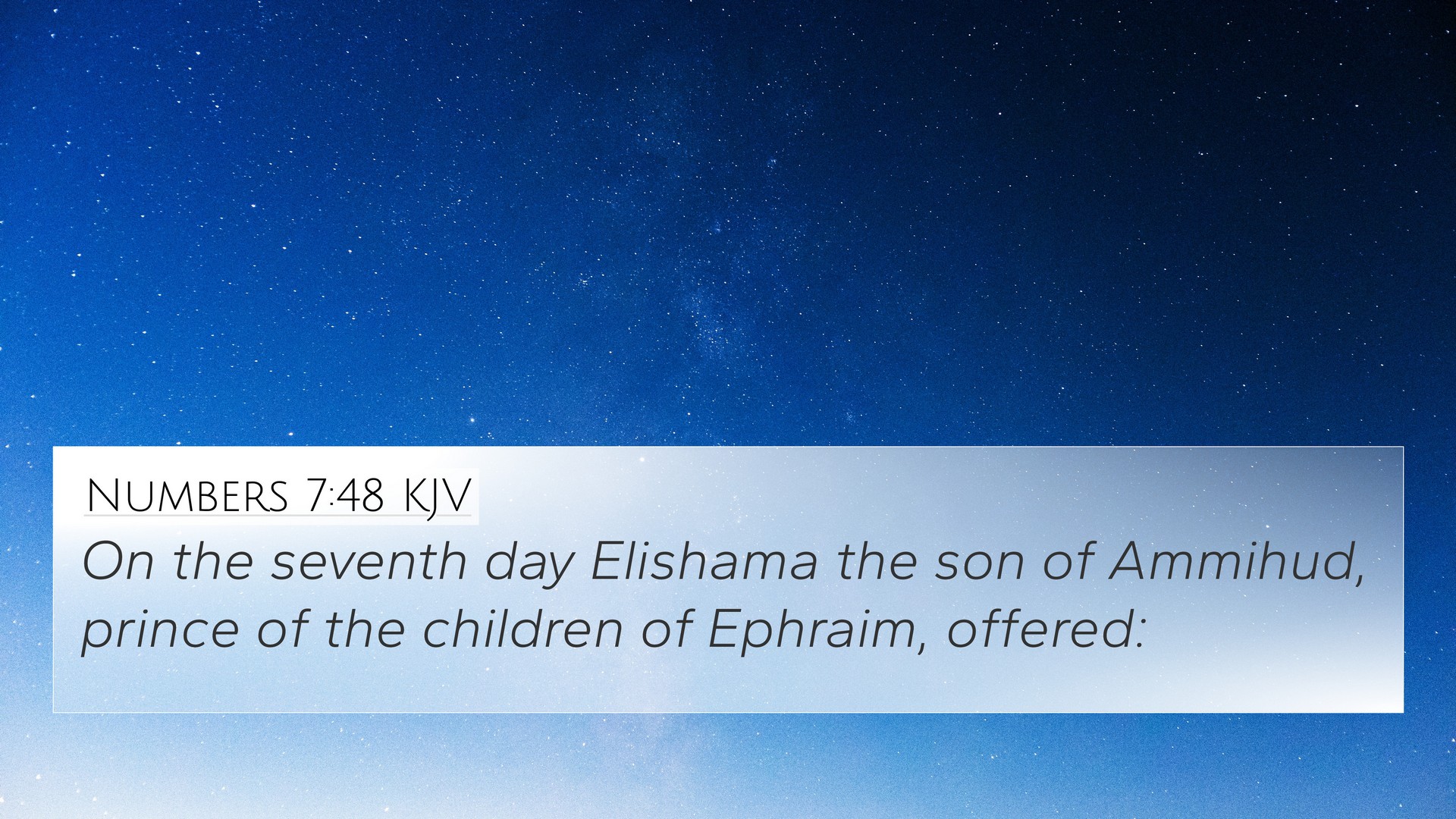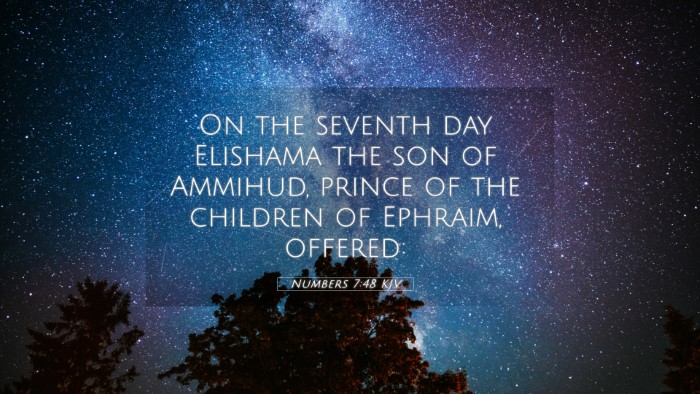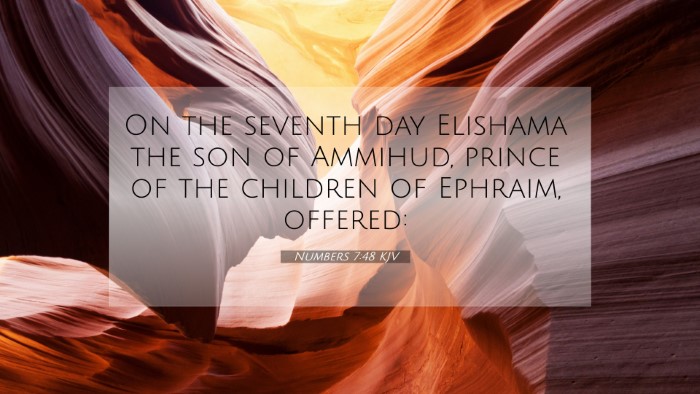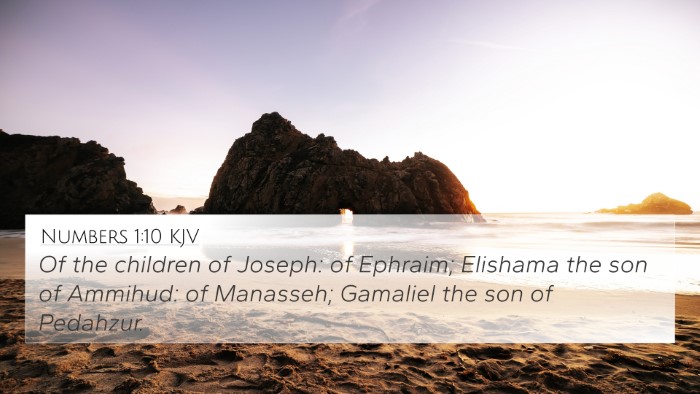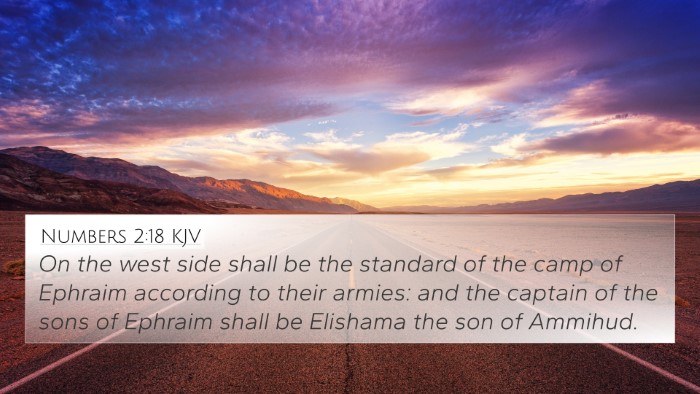Understanding Numbers 7:48
Numbers 7:48 states: "On the seventh day, Elishama the son of Ammihud, the prince of the children of Ephraim, offered." This verse belongs to a larger context in which various leaders of Israel bring offerings for the dedication of the altar. The significance of these offerings and the order in which they happen carries theological and practical implications for the ancient Israelite community and for us today.
Contextual Overview
This verse is set within a detailed description of the contributions made by tribal leaders during the dedication of the altar. Each leader offers gifts, highlighting Israel's collective worship and unity. The repetitious nature of these accounts underscores the importance of these offerings and the establishment of the Levitical priesthood.
Thematic Significance
The offerings brought forth by leaders, such as Elishama, are emblematic of dedication and leadership in service to God. Leaders are to inspire, demonstrate commitment, and model faithfulness to their community. As such, Numbers 7:48 presents a powerful glimpse into the themes of leadership and dedication, which reverberate through Biblical texts.
Cross References
- Exodus 40:29-30: Discusses the priests’ sanctification and the purpose of offerings.
- Leviticus 23:37-38: Outlines the gifts brought during holy feasts.
- Deuteronomy 12:11: Commands placing offerings at the chosen place of worship.
- Matthew 5:23-24: Jesus teaches about the importance of reconciliating before offering.
- 2 Corinthians 9:7: Stresses the principle that God loves a cheerful giver.
- Hebrews 13:15: Encourages the offering of praise to God as a sacrifice.
- Romans 12:1: Calls believers to present their bodies as living sacrifices.
- 1 Peter 2:5: Describes believers as a holy priesthood offering spiritual sacrifices.
- Acts 2:44-45: Early believers shared their possessions, mirroring the communal spirit.
- Philippians 4:18: References the offering made to Paul, illustrating partnership in ministry.
Insights from Commentaries
Matthew Henry
Matthew Henry emphasizes that this record illustrates the unity among different tribes of Israel. Each tribe's offering represents a piece of collective worship, showing that every individual and tribe was important in their relationship with God. The detailed listing of offerings symbolizes the means through which they engaged with God and fulfilled their covenantal obligations.
Albert Barnes
Albert Barnes draws attention to the significant role of the tribal leaders in the religious life of Israel. Their offerings were not just personal acts of devotion but served to unite the nation in worship and dedication to God. Barnes further notes that the specific mention of each leader alongside their offerings helped reinforce the principle of accountability among the leadership.
Adam Clarke
Adam Clarke considers the implications of these offerings in light of the Israelites' identity as a chosen people. He suggests that the offerings are indicative of a deep-seated need for atonement and dedication, linking this act of offering to the broader narrative of sacrifice found throughout Scripture. Clarke's commentary serves to connect the themes of dedication in this passage to the Redemptive work anticipated in later texts.
Practical Applications
The act of offering should inspire contemporary believers to consider their own dedication to God. Just as tribal leaders made offerings, individuals today are called to serve, commit, and dedicate their gifts for the benefit of the community and the glory of God. Reflecting on Biblical offerings can lead to transformations in how one's life is lived in faith and service.
Reflection Questions
- What does Numbers 7:48 teach us about leadership and service in our communities today?
- How can we incorporate the principles of dedicated offerings in our lives and church practices?
- In what ways does understanding these connections between different Bible verses help deepen our faith?
- How should the themes of sacrifice and commitment resonate with believers in the New Testament context?
Conclusion
Numbers 7:48 is more than a historical snapshot; it is a rich verse that encapsulates the principles of leadership, dedication, and communal worship found throughout the Bible. By utilizing tools for Bible cross-referencing, one can uncover thematic connections and deepen their understanding of scriptural teachings. The connections drawn from Numbers 7:48 serve as a launchpad for exploring the rich tapestry of Biblical truth that encourages believers to live lives of dedicated service.
